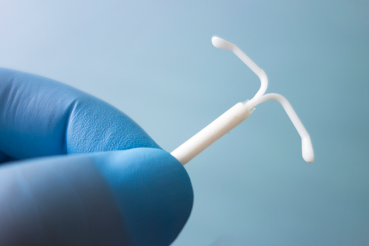Steve had been bothering Melania Nunez for four years.
“Steve” is what Nunez calls her thyroid nodule, also known as a goiter or enlargement of the thyroid.
For several years she managed it at home in Cicero, Illinois, with diet, exercise and naturopathic medicine. But after a case of COVID-19 in January, she says the nodule and her symptoms grew worse and became unmanageable.
It was time for Steve to go. And a nonsurgical treatment at RUSH University Medical Center was the answer.
Trouble breathing, swallowing
Thyroid nodules, typically benign solid masses, can be caused by several conditions. Nunez’s was caused by Hashimoto’s disease, an autoimmune disorder where the immune system attacks the thyroid and causes it to swell.
The nodule caused Nunez to have trouble breathing and swallowing, and it sapped her energy. But she said the worst symptom was its effect on her self-confidence after the nodule changed the shape of her face and neck.
“I was not aligned with myself,” she said. “I didn’t like looking at myself in the mirror. I had a profound lack of self-love from having such a large goiter.”
When she was diagnosed in 2018, and at further follow-up visits, her endocrinologist told her the only treatment was partial or full removal of the thyroid. This was going to mean surgery under general anesthesia, followed by recovery and a scar on her neck. It would potentially mean lifelong medications to replace the hormones that her thyroid made naturally. And it would mean precious time away from her 13-year-old son, who has high-functioning autism, and a major disruption of their daily routine.
“As a special needs mom, I needed to know that there was something available that wasn’t going to interrupt my day-to-day life,” she said.
So she waited for another option.
Relief without surgery
She first heard about radiofrequency ablation, or RFA, not from one of her physicians, but on Instagram, where she found a video of a physician discussing the procedure as an alternative to surgery for nodule treatment. She spoke with her endocrinologist, who referred her to Sean Wrenn, MD, an endocrine surgeon at RUSH, who offers the procedure alongside standard thyroid surgery.
Instead of surgery, RFA uses electrical impulses to kill off the cells in the nodule. Over time, the nodule then shrinks as the body removes the dead tissue. The procedure uses a needle inserted into the nodule, similar to when a thyroid biopsy is performed.
“It’s an office-based procedure, similar to a regular doctor’s appointment,” Wrenn said. “Many of the patients who’d undergo this have already had a thyroid biopsy before, so they may have an intuitive understanding of what the procedure’s like.”
Patients are awake during the procedure, though the area is numbed. Patients are able to go home the same day and treat any discomfort afterward with over-the-counter pain medication, Wrenn said. If medically possible, he offers both RFA and surgery as options to his patients, to go over the benefits of each.
“Thyroid surgery is very safe and effective, and for some people it’s the right option,” Wrenn said. “I usually talk them through both choices and do a custom approach that works best for them.”
For Nunez, the decision was easy.
“Dr. Wrenn made me feel comfortable, and made me feel safe,” she said. “He listens to you and explains the pros and cons. He said, ‘I can’t assure you 100% resolution, but I can assure you some improvement, and that’s what I needed.”
On April 17, she went in to try to get rid of Steve.
Road to recovery
“It is up to a one-year process,” Wrenn said. “I always brace patients that after the procedure the nodule won’t seem any different. Some people will see a lot of changes within the first few months, and then sometimes it will slow down a little after that, but you’ll continue to see effects for up to a year."
Nunez estimates that since she had her RFA procedure, her nodule has decreased about 30%, which she’s very satisfied with. She looks better and has noted a distinct change in her energy — she has even switched to decaf coffee.
“My eyes have started to look even,” she said. “There isn’t as much pressure when I swallow. I have a neck again, I have a face again. I have so much more energy. There is a shift in my labs as well. But most important is my self-confidence.”
Benefits of radiofrequency ablation
Wrenn said that patients like Nunez who are looking for a nonsurgical option to treat their thyroid nodules should ask their doctors about RFA.
“If folks are worried about general anesthesia or have medical conditions that would put them at higher risk for general anesthesia, RFA helps them get around that,” he said. “It helps them avoid a scar, and it helps them potentially avoid thyroid hormone medication.
“But it’s important to note that surgery may be a better option, or the only option, for other patients, depending on their case.”
Nunez has shared her health experience with followers on social media. She emphasizes that patients, particularly women, should work to advocate for themselves when navigating the health care system.
“RFA has been life-changing for me,” she said. “I would say make sure you ask the questions that need to be asked. It may feel uncomfortable. Feel uncomfortable! But ask the questions. Ask what else may be available to you.”




